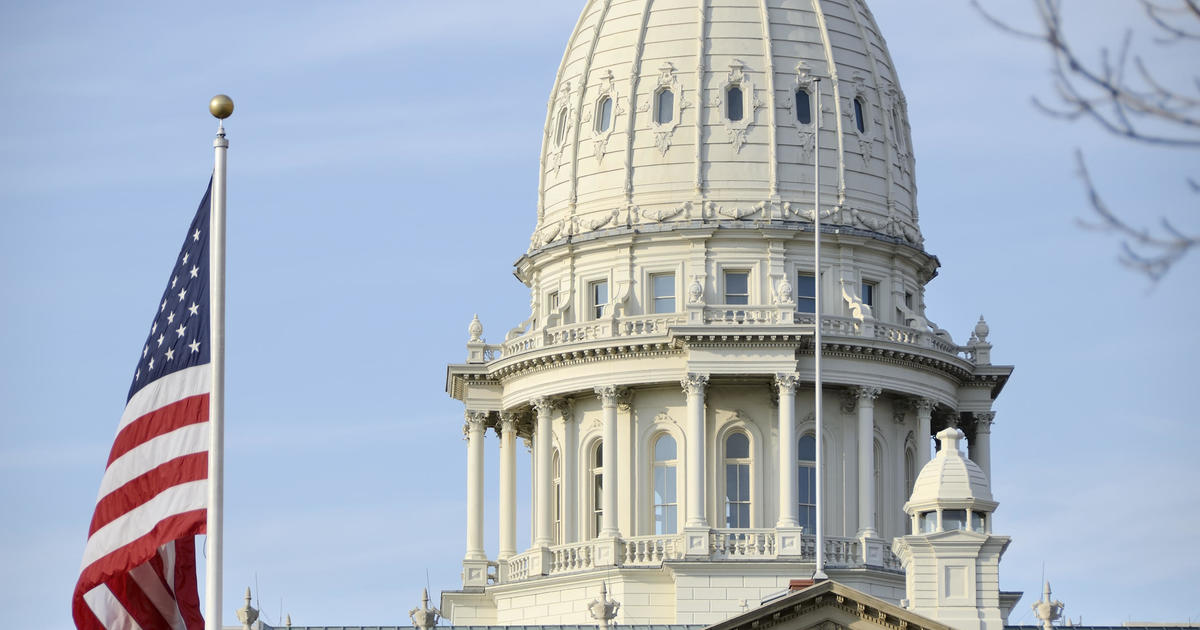Michigan GOP Approves Right-To-Work Legislation Amid Protests
LANSING (WWJ/AP) - Republicans rushed right-to-work legislation through the Michigan Legislature Thursday, drawing raucous protests from hundreds of union supporters, some of whom were arrested when they tried to storm the Senate chamber.
Just hours after they were introduced, both chambers approved measures prohibiting private unions from requiring that nonunion employees pay fees. The Senate quickly followed by voting to impose the same requirement on most public unions.
Because of rules requiring a five-day delay between votes in the two chambers on the same legislation, final enactment could not take place until Tuesday at the earliest.
Opponents of so-called right-to-work measures say they drain unions of money and weaken their ability to bargain for good wages and benefits. Supporters insist it would boost the economy and job creation.
A victory in Michigan would give the movement its strongest foothold yet in the Rust Belt region, where organized labor already has suffered several body blows.
But even before the votes, protesters streamed inside preparing for what appeared inevitable after Gov. Rick Snyder joined GOP legislative leaders Thursday morning in announcing they would push swift passage.
"This is all about taking care of the hard-working workers in Michigan, being pro-worker and giving them freedom to make choices," Snyder said during a news conference with House Speaker Jase Bolger and Senate Minority Leader Randy Richardville.
"The goal isn't to divide Michigan, it is to bring Michigan together," Snyder said.
Lt. Gov. Brian Calley repeatedly gaveled for order as Democratic senators denounced the legislation to applause from protesters in the galley. At one point, a man shouted, "Heil Hitler! Heil Hitler! That's what you people are." He was quickly escorted out. Another later yelled, "We will remember in November."
Eight people were arrested for resisting and obstructing when they tried to push past two troopers guarding the Senate door, state police Inspector Gene Adamczyk said. (More on this).
The Capitol, which was temporarily closed because of safety concerns, reopened Thursday afternoon, sending hundreds of protesters streaming back inside with chants of, "Whose house? Our house!" Adamczyk said a judge ordered the building reopened.
But the decision to push forward in the waning days of the Legislature's lame-duck session infuriated outnumbered Democrats, who resorted to parliamentary maneuvers to slow action but were powerless to block the bills that were introduced Thursday.
Protesters waved placards and chanted slogans such as "Union buster" and "Right-to-work has got to go." Adamczyk said the troopers used pepper spray after the people refused to obey orders to stop.
He estimated that about 2,500 visitors were inside the Capitol, where their shouts reverberated off stone halls and frequently could be heard inside the ornate chambers.
After repeatedly insisting during his first two years in office that right-to-work was not on his agenda, Snyder reversed course Thursday, a month after voters defeated a ballot initiative that would have barred such measures under the state constitution.
Snyder and the GOP leaders insisted the legislation was not meant to weaken unions or collective bargaining, saying it would make unions more responsive to their members.
Lansing Bureau Chief Tim Skubick noted that Snyder had, for the last three years, withheld his support for such legislation. "But he's had basically a reassessment of where we are . He says Indiana has right-to-work and they're getting lots of jobs that Michigan is not getting."
Senate Democratic leader Gretchen Whitmer said she was "livid."
"These guys have lied to us all along the way," she said. "They are pushing through the most divisive legislation they could come up with in the dark of night, at the end of a lame-duck session and then they're going to hightail it out of town. It's cowardly."
Republicans have commanding majorities in both chambers - 64-46 in the House and 26-12 in the Senate. Under their rules, only a simple majority of members elected and serving must be present to have a quorum and conduct business. For that reason, Democrats acknowledged that boycotting sessions and going into hiding, as some lawmakers in neighboring Indiana and Wisconsin have done in recent years to stall legislation unpopular with unions, would be futile in Michigan.
Throngs of protesters spent weeks outside capitol buildings in those states, clashing over union rights.
"We will not have another Wisconsin in Michigan," Adamczyk said. "People are allowed to protest, but they need to do in a peaceful manner."
Marrick Masters, Director of Labor Studies at Wayne State says the facts don't support Snyder's assertion that a right-to-work law would being jobs to our state.
"I think that it's picking a fight that doesn't need to be fought," Masters told WWJ Newsradio 950."I think it's a blatant anti-union strategy and it's aimed at basically eviscerating unions."
"Right-to-work laws do not reduce unemployment; they do not increase per capita income. In fact, right-to-work laws are associated with lower levels of wages, lower levels of benefits and higher incidents of occupational safety and health hazards," Masters said.
Masters said he's not surprised at the speed with which Lansing republicans are pushing the legislation. He said the GOP feels the time is right.
If enacted, Michigan would be the 24th state with a right-to-work law.
(TM and © Copyright 2012 CBS Radio Inc. and its relevant subsidiaries. CBS RADIO and EYE Logo TM and Copyright 2012 CBS Broadcasting Inc. Used under license. All Rights Reserved. This material may not be published, broadcast, rewritten, or redistributed. The Associated Press contributed to this report.)



